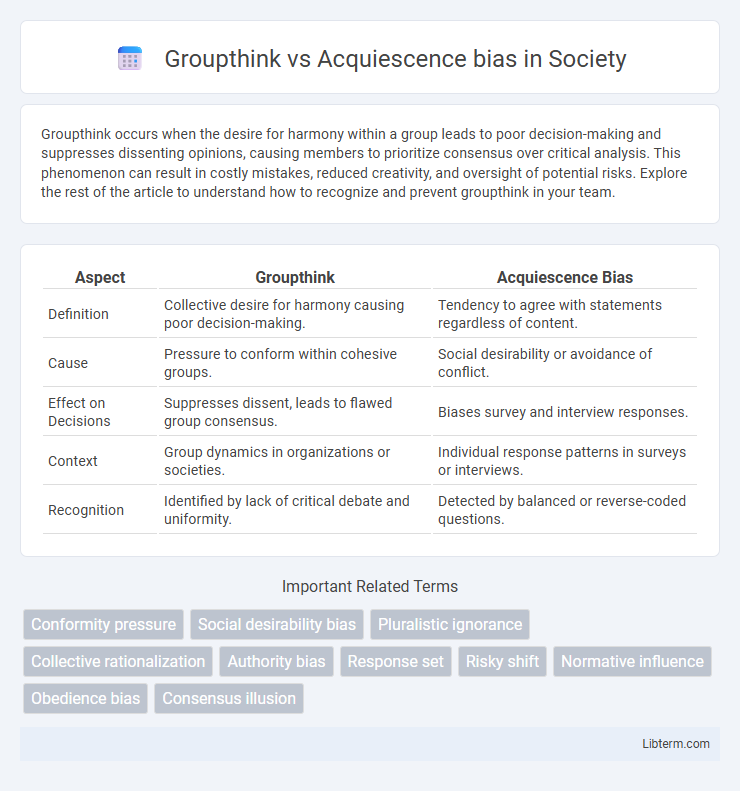Groupthink occurs when the desire for harmony within a group leads to poor decision-making and suppresses dissenting opinions, causing members to prioritize consensus over critical analysis. This phenomenon can result in costly mistakes, reduced creativity, and oversight of potential risks. Explore the rest of the article to understand how to recognize and prevent groupthink in your team.
Table of Comparison
| Aspect | Groupthink | Acquiescence Bias |
|---|---|---|
| Definition | Collective desire for harmony causing poor decision-making. | Tendency to agree with statements regardless of content. |
| Cause | Pressure to conform within cohesive groups. | Social desirability or avoidance of conflict. |
| Effect on Decisions | Suppresses dissent, leads to flawed group consensus. | Biases survey and interview responses. |
| Context | Group dynamics in organizations or societies. | Individual response patterns in surveys or interviews. |
| Recognition | Identified by lack of critical debate and uniformity. | Detected by balanced or reverse-coded questions. |
Understanding Groupthink: Definition and Characteristics
Groupthink is a psychological phenomenon where the desire for harmony and conformity within a group leads to irrational or dysfunctional decision-making outcomes. It is characterized by the suppression of dissenting opinions, illusion of unanimity, and collective rationalization, which impede critical evaluation of alternatives. This bias often causes groups to overlook potential risks and ignore contradictory evidence in favor of consensus.
Acquiescence Bias Explained: Meaning and Causes
Acquiescence bias refers to the tendency of respondents to agree with statements regardless of their content, often driven by a desire to please the interviewer or avoid confrontation. This bias commonly occurs in survey research and can distort data accuracy, leading to inflated agreement rates and misleading conclusions. Causes include social desirability, lack of understanding of questions, and cultural factors promoting conformity.
Key Differences Between Groupthink and Acquiescence Bias
Groupthink occurs when the desire for harmony in a decision-making group leads to irrational or dysfunctional outcomes, as members suppress dissenting opinions to maintain consensus. Acquiescence bias is the tendency of individuals to agree with statements or questions regardless of their actual beliefs, often due to social pressure or a desire to please others. The key difference lies in groupthink being a collective phenomenon affecting group dynamics and decision quality, while acquiescence bias is an individual cognitive bias influencing survey or interview responses.
Psychological Mechanisms Behind Groupthink and Acquiescence Bias
Groupthink arises from a psychological need for harmony and conformity within a group, leading individuals to suppress dissenting opinions to maintain consensus. Acquiescence bias stems from an individual's tendency to agree with statements or questions regardless of content, driven by a desire to avoid conflict or to please the interviewer. Both biases involve social influence and cognitive shortcuts, but groupthink is collective conformity, while acquiescence bias is an individual response tendency.
Common Scenarios: Where Each Bias Typically Occurs
Groupthink commonly arises in high-pressure decision-making environments such as corporate boardrooms, government policy teams, and jury deliberations where the desire for consensus overrides critical evaluation. Acquiescence bias frequently occurs in survey research, customer feedback forms, and interviews where respondents tend to agree with statements regardless of their true opinions. Both biases distort authentic perspectives but manifest distinctly in collaborative settings versus individual response scenarios.
Impact on Decision-Making and Group Dynamics
Groupthink leads to poor decision-making by promoting conformity and suppressing dissenting opinions, resulting in a lack of critical evaluation within groups. Acquiescence bias causes decisions to skew towards agreement, often overshadowing genuine preferences, which undermines authentic group input and diversity of thought. Both biases negatively affect group dynamics by fostering an environment where independent thinking is discouraged, leading to less effective problem-solving and innovation.
Real-World Examples Illustrating Each Bias
Groupthink often manifests in corporate boardrooms where unanimous decisions lead to overlooked risks, such as the Challenger Space Shuttle disaster in 1986 where engineers' concerns were suppressed to maintain consensus. Acquiescence bias appears frequently in survey research, exemplified by respondents agreeing with statements regardless of their true opinions, skewing data accuracy in political polling. Both biases compromise critical judgment but arise from different social pressures--group cohesion versus compliance to authority or survey design.
Consequences of Groupthink vs Acquiescence Bias
Groupthink results in poor decision-making due to the suppression of dissenting opinions, leading to flawed outcomes and reduced creativity within groups. Acquiescence bias causes inaccurate survey or research results as participants tend to agree with statements regardless of their true beliefs, undermining data validity. Both biases compromise critical evaluation, but groupthink primarily affects collective decisions while acquiescence bias impacts individual response reliability.
Strategies to Prevent Groupthink and Reduce Acquiescence Bias
Encouraging open dialogue and diverse perspectives effectively prevents groupthink by promoting critical thinking and independent decision-making. To reduce acquiescence bias, employing anonymous surveys and framing questions neutrally helps elicit honest responses without social pressure influence. Implementing structured decision-making techniques like the Delphi method enhances objective evaluation and minimizes conformity-related errors.
Promoting Critical Thinking and Independent Judgement
Groupthink suppresses dissenting opinions in favor of consensus, leading to poor decision-making, whereas acquiescence bias causes individuals to agree with statements regardless of their true beliefs, skewing honest feedback. Promoting critical thinking involves encouraging open dialogue, questioning assumptions, and valuing diverse perspectives to counteract conformity pressures in both phenomena. Independent judgment is strengthened through structured debate and reflective practices, enabling individuals to analyze information objectively and resist the urge to conform or simply agree.
Groupthink Infographic

 libterm.com
libterm.com